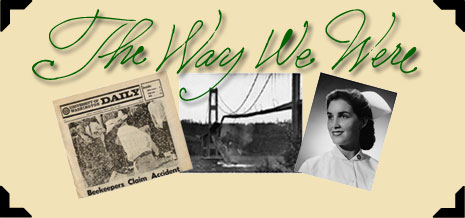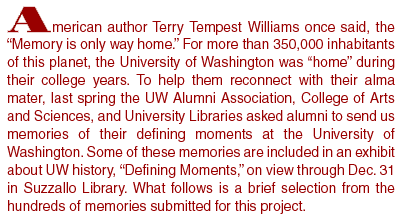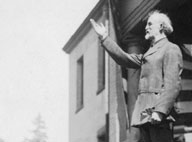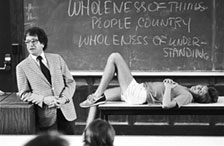



TEACHERS
WITNESS TO A LEGEND
I may be one of very few alumni still alive who had the pleasure of hearing lectures by Professor Edmond S. Meany after whom so many Seattle and University landmarks are named. ... One aunt, from the class of 1927, was doing graduate work in Northwest history, and therefore taking Dr. Meany's courses. She asked permission to have me attend classes with her, where I learned to take notes at an early age (11), and was graded on my notes in the evening.

I had been told about Professor Meany's importance, but was somewhat disappointed when he shuffled onto the podium. How could anyone that old hold the interest of several hundred students? But when he spoke, the years melted away, and the class was intent on every word. He obviously loved his subject and was a dynamic speaker. He did not need to refer to notes. Naturally, when it came time to settle on a college, I would not even consider anything other than the UW. On the wall in my den I have UW diplomas from three generations of family.
-Anne Taylor, '42
POETIC ENCOUNTER
In 1960, I had the privilege of taking a poetry class from Theodore Roethke. Enclosed is a poem I wrote about him entitled, "Recollections of Roethke." I must have assimilated Roethke's love of words because I have published several poetry books and won the Pacific Northwest Writer's Conference Award. Today, I walk past Roethke's former classroom in the northwest corner of Parrington Hall on my way to teach in the English language program. I pause to reflectó here has been the beginning, middle, and end of my life.
-Shirley Ruble
RECOLLECTIONS OF ROETHKE
Fringed in white hair he sat before his students,
disseminating patience,
watching them with prudence,
not unkindly.
His voice did not boom or rasp
when he addressed the class.
You did not see a nervous gesture
or catch him in an indecorous posture.
Attired in a rumpled, blue suit,
white shirt and striped tie,
he appeared to be the proper professor
until his glance caught your eye.
Then there was a flash as keen as light
into a darkened room,
when the sun rises
into the waiting gloom.
Who knew this friendship would end
before we could understand
what lay behind his ruddy, benign face
or those soft, quiet hands?
He was so relaxed it seemed to me
He wore a heavy tiredness in his heart.
His humor rose out of the depths
where joy and sorrow are not far apart.
We knew his poetry was good,
if good means beautiful and true,
but he escaped from out our sight
joking about his talent, too.
"Flat words from a fat man," he said
dismissing the motionless twenty-three.
An animal trainer opening the cage letting his pets go free.
A RUSSIAN CLASSIC
When I was a student, "Willis" was just becoming known on campus in the early '60s for his lively interpretations of Russian literature. He had, and still has, a way of bringing students into a dialogue so that the themes of the literature (and now films) being studied are indelibly imprinted on his students.

When I traveled to the Soviet Union during a chilly time in the Cold War, I could see characters from Tolstoy, Dostoyevsky and Pushkin walking on the streets or working in the hotels or museums. And even conversations with stern bureaucrats we were permitted to meet with warmed a little when I could turn the subject to Russian literature. The memories of those classes in Smith Hall and Parrington will stay with me always.
-Karen Hanson Munro, '65
MAKING ENGINEERS THINK OUT OF THE BOX
One of my best memories of my time at the UW is of Amy Violet Hall. In 1944-1946, I was a Navy V-12 engineering student, deeply embedded in such matters as thermodynamics, strength of materials, internal combustion engines and the like. Amy apparently thought it was a shame that we engineering nerds were going through our undergraduate years with little or no exposure to the real world. She set herself up with an office in the engineering arena and offered a one-credit course that was essentially a survey course in the world of literature.  Amy made this tiny trip into the world of the liberal arts one of true excitement and pleasure. I did not realize it at the time, but she embedded in me a life-long desire to expand my core knowledge of the world, the cultures, the histories, the art and the literature that helps give one a better understanding of mankind. Amy even dared to believe that an engineering student could acquire a sufficient breadth and depth of knowledge to qualify as a member of Phi Beta Kappa. She arranged for a few of us to take a battery of tests to see if we qualified, and I became one of the first engineering graduates from the University of Washington to become a member. Such a tiny woman with such a big heart!
Amy made this tiny trip into the world of the liberal arts one of true excitement and pleasure. I did not realize it at the time, but she embedded in me a life-long desire to expand my core knowledge of the world, the cultures, the histories, the art and the literature that helps give one a better understanding of mankind. Amy even dared to believe that an engineering student could acquire a sufficient breadth and depth of knowledge to qualify as a member of Phi Beta Kappa. She arranged for a few of us to take a battery of tests to see if we qualified, and I became one of the first engineering graduates from the University of Washington to become a member. Such a tiny woman with such a big heart!
-Donald E. Petersen, '46
Go To: Page 1 | Page 2 | Page 3